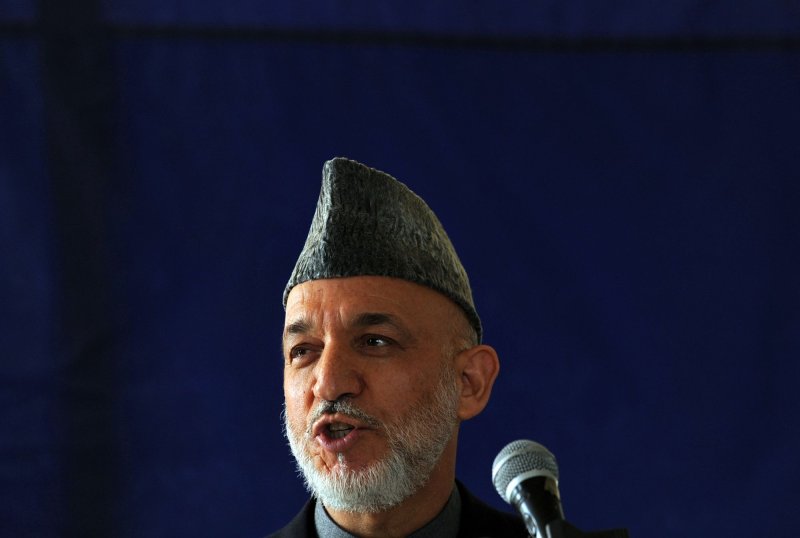1 of 3 | Afghan President Hamid Karzai talks to US soldiers in Bagram Airfield during a visit on May 8, 2010. Karzai said the United States and its allies still have a long way to go before their security operations are successful in his country. "We have traveled far together, but the international effort in Afghanistan still has miles to go," Karzai wrote in an op-ed piece in The Washington Post. "We are not yet delivering security to large portions of the country." UPI/Massoud Hossaini/POOL |
License Photo
WASHINGTON, May 10 (UPI) -- At the beginning of Afghan President Hamid Karzai's visit to Washington this week, U.S. officials are trying to leave behind tensions between the two countries, instead stressing a new kind of partnership.
"President Karzai is the duly elected leader of the sovereign country of Afghanistan," White House Press Secretary Robert Gibbs said Monday. "He is our partner."
On the issues that have caused the recent public fallout, Gibbs added, "We will work with him to make improvements on governance and corruption."
During U.S. President Barack Obama's last visit to the Afghan capital Kabul at the end of March, U.S. officials scolded the Karzai government for not having done enough to fight corruption. Karzai alleged the United States wanted to make his administration a puppet government without its own autonomy.
The new administration strategy appears to be one of conciliation.
"Every bilateral relationship, especially one as close as with Afghanistan, experiences ups and downs," said Karl Eikenberry, the U.S. ambassador to Afghanistan, echoing similar statements made by Gibbs and deputy national security adviser Ben Rhodes.
He said the visit would show the United States and Afghanistan are "able to work our way through difficulties and come back together. I think we're going to emerge an even better alliance," Eikenberry said at a briefing with Gibbs and U.S. Army Gen. Stanley McChrystal, the commander of U.S. and international forces in Afghanistan.
The friendly overtones may pave the way for better cooperation between the two countries.
"I think the Obama administration realizes that it has to have an effective partnership with the Karzai government if it wants to succeed in stabilizing Afghanistan and preventing the Taliban to return to power there," said Lisa Curtis, senior research fellow with the Heritage Foundation, a conservative think tank in Washington.
Curtis called the public sparring of the last weeks "extremely unproductive," saying that it shed a negative light on the Karzai administration both with the American and Afghanistan publics.
This week's visit provides an opportunity to reassess U.S. strategy. About half of the additional troops committed to the Obama administration's surge have arrived in Afghanistan, along with about 9,000 additional troops from other international partners.
McChrystal, at the briefing, reiterated previous statements supporting the counterinsurgency strategy he pioneered. The plan calls for winning over the population instead of killing insurgent fighters.
"Our efforts in Afghanistan are ultimately about changing the perceptions of the people," he said, adding that the Afghan population needs tangible improvement in security to support U.S. forces. McChrystal said he is confident that the momentum will shift away from insurgents.
Among the topics discussed will be how to reintegrate low-level, moderate Taliban fighters -- the foot soldiers -- into the Afghan society. U.S. officials said they want the Afghan government to take the lead in this process but Curtis said despite these assurances the United States will play a large role.
"I think it's a reality that the U.S. will have to be deeply involved with any policy," regarding reintegration of insurgents, Curtis said. "The U.S. and the Karzai administration have to work hand in glove."
Karzai and other Afghan officials will meet with their counterparts in Washington through Thursday. Karzai is also planning to visit the Arlington National Cemetery in Virginia.





